Dell Studio XPS 16: the Eyes Have It
by Jarred Walton on April 2, 2009 6:00 PM EST- Posted in
- Laptops
Battery Life
For battery life testing, we run all laptops at around 100 nits brightness. If you choose to run your LCD at maximum brightness, you may lose anywhere from 10 to 60 minutes depending on the laptop and the display. In the case of the Studio XPS 16, maximum brightness is 280 nits and uses 9W more power, so the impact on battery life is quite significant (see the idle chart below for reference).
We run several different battery life scenarios: Internet surfing (load several webpages using the wireless adapter every minute until the battery dies), DVD playback, x264 playback, and idle (maximum) battery life. For x264 playback, we copy a 720p file to the hard drive and loop playback using Windows Media Player Classic Home Cinema; we will include scores from other laptops, but it's worth noting that we did not have GPU accelerated x264 decoding enabled in previous laptop tests. We have battery life results for Blu-ray playback on laptops that ship to us with a Blu-ray drive. We've also included web surfing results (and DVD for the MacBook Pro) for the latest Apple MacBooks as a point of reference.
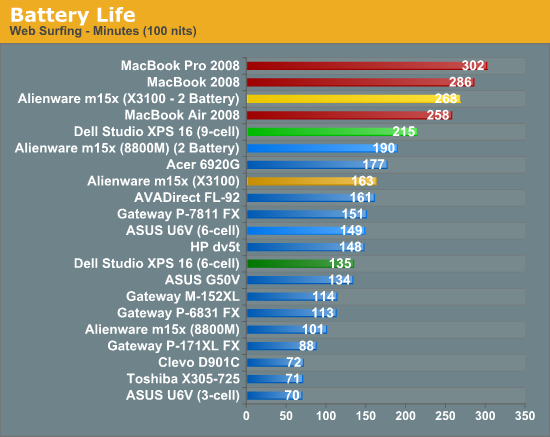
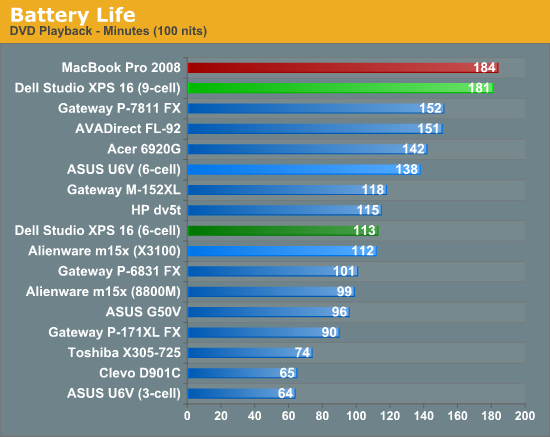
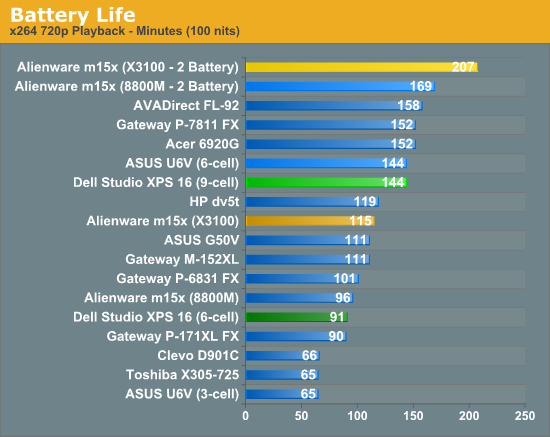
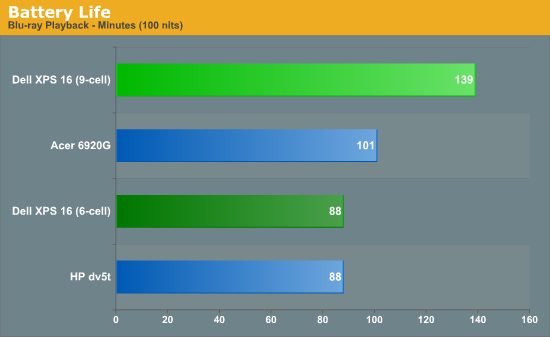
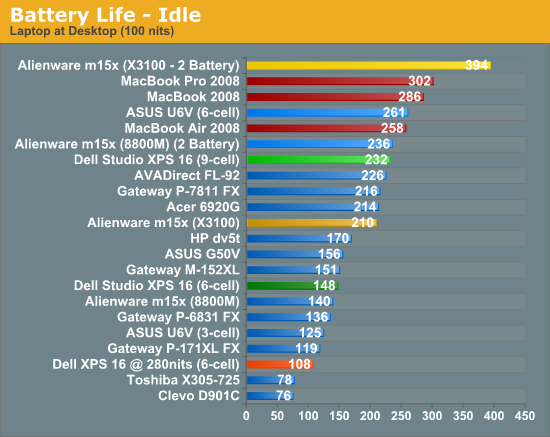
Battery life is nothing special, particularly when compared with similarly equipped notebooks. Purchasing the extended capacity battery does allow you to reach over three hours of battery life, but the same can be said of other notebooks. You can also see what happens if you turn up the display brightness. At maximum brightness sitting at the desktop, you only get 108 minutes of battery life. Perhaps that's just the price we have to pay for the beautiful LCD.
As we've mentioned in the past, Apple's MacBook and MacBook Pro provide an almost untouchable amount of battery life. To give you a true apples-to-Apples comparison, we've calculated the amount of battery life you get per Whr (Watt Hour) of battery capacity:
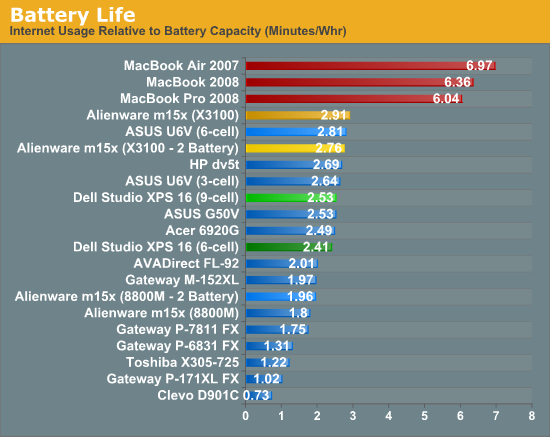
We can only hope that Windows 7 will help improve the battery life situation and level the playing field. However, we also suspect that the hardware manufacturers could be doing a lot more to improve battery life on their laptops. The closest we have come to matching the Minutes/Whr score of the MacBooks was with an ASUS N10JC netbook, which isn't even on the same continent in terms of performance. Apple is getting over six minutes per Whr, and most similarly equipped Vista notebooks are luck to come close to 3 min/Whr. Note that testing a MacBook with Vista using Boot Camp also cut the Apple battery life roughly in half.










79 Comments
View All Comments
baadcatj - Friday, April 3, 2009 - link
Hey Jarred, following the link, Dell still has the $343 off special with the upgraded panel, but it looks like they changed it as it doesn't include the upgraded cpu - unless I missed something; If it is still available with the processor upgrade, will you please let me know what I'm doing wrong?Thx & great job on the article :-)
JarredWalton - Friday, April 3, 2009 - link
My guess is that Dell realized their mistake and changed the CPU out. I know when I first looked it was a T9550... unless I was seeing things? :-)Joelist - Friday, April 3, 2009 - link
It is definitely not one of the JMicron crap jobs.I have one of these with the SSD and the T9550. It is VERY fast, and the SSD even makes it run a lot cooler than expected. There is no stuttering and everything is super responsive.
Remember that any Dell SSD will be Samsung, as the two are strategic partners on the SSD front.
JarredWalton - Friday, April 3, 2009 - link
I've updated the text to clarify, but even the Samsung SSDs aren't perfect, http://www.anandtech.com/storage/showdoc.aspx?i=35...">as seen here. I stand by the recommendation that if you really want an SSD, read Anand's article and then purchase one on your own. Personally, I wouldn't even consider anything less than the Indilinx options, but I'd try for the Intel models.MadBoris - Sunday, April 5, 2009 - link
"(Note: one reader indicates the SSD uses a Samsung controller, which is better than the JMicron options. However, Samsung SSDs are still prone to degradation over time.)"I guess you are unaware how folks out there have stumbled on how badly Intel X25-m's degrade. There has been several forums where users have come across it and have noticed really bad drops in the Intels but here's pcperspectives test as one example.
http://www.pcper.com/article.php?aid=669">http://www.pcper.com/article.php?aid=669
Running the right or wrong benchies on the Intel can make it look great or horrible. X25-m is still nice but it has some serious issues too that the Samsung 256GB doesn't have.
Quote from pcper on the intel x25-m "Once internal fragmentation reached an arbitrary threshold (somewhere around 40 MB/sec average write speed), the drive would seem to just give up on ‘adapting’ its way back to solid performance. In absence of the mechanism that normally tries to get the drive back to 100%, large writes do little to help, and small writes only compound the issue by causing further fragmentation. In several tests our write speeds dropped to 25-30 MB/s and simply refused to recover on their own, even with several successive passes of HDTach as well as any other application we could find to write a solid file across the entire drive."
Although Anand did find a test to show the new OCZ's (similar but different to this samsung) to have degradation, while the Intel didn't. More thorough testing shows the Samsung never degrades to the levels that x-25m can and do, so Samsungs new MLC controller is superior in that regard.
MadBoris - Sunday, April 5, 2009 - link
So it appears the X-25m issue maybe corrected by a new upcoming firmware, although that doesn't diminish the shining quality/price of this 256GB SSD.JarredWalton - Sunday, April 5, 2009 - link
Again, I still stand by my statement: if you want an SSD, but one on your own, when and if the price is right. If the $400 Samsung SSD is great, it will still be great when it's available and tested separately at retail. It will probably also cost less than $400 at that point. If you can't or won't wait, certainly a 256GB SSD is a nice upgrade that provides sufficient storage while also boosting speed and reducing temperatures. It's still a very high-end option, and it's new enough that I would personally hold off pending further testing.The X25-M has been beat on as hard as any SSD out there, and the performance degradation issue only occurred (as far as I'm aware) after specific artificially produced read/write patterns. Intel has said they will fix the issue, and I don't doubt their claim. It appears they may have already done so. Will the Samsung avoid similar issues under artificial test conditions? Maybe, maybe not. It's not in enough hands at present to say with certainty that it's the best option, and waiting a month or two shouldn't hurt.
MadBoris - Monday, April 6, 2009 - link
"Again, I still stand by my statement: if you want an SSD, but one on your own, when and if the price is right. If the $400 Samsung SSD is great, it will still be great when it's available and tested separately at retail. It will probably also cost less than $400 at that point."I don't know of any plans at this point to go retail on this drive, at least their wasn't recently. That is why OCZ licensed it from Samsung along with it being just for OEM channels like Apple, Dell, HP etc. The Summit will go for $999 and you somehow don't realize what a value this Samsung drive is at a $400 upgrade. That's ok, you obviously haven't seen it tested, can't hold it against you except you are leading people away from it without knowing it's quality. Which is why some of us spoke up I think. No way it would come to retail for less, if it ever was available.
Like you said, SSD's are Anand's baby and until you see the new 256GB Samsung tested, you won't realize it is a next gen MLC drive (far different than the Sammy 128, OCZ apex 256, or G.skill 256). I don't hold it against you to not know it is above the crowd until it is tested, but I do think you are assuming it's in the group of crap SSD's by recommending people pass on this steal. Maybe if Anand tests it you guys will realize it is by far one of the best price/performance SSD's around, unfortunately it's only with a new PC. It may not dethrone the X-25M but it doesn't need to even though it out performs it in certain aspects, I don't need an Intel Extreme CPU either for 5% performance increase.
Thanks for the review, I was just trying to let you know there is something that slipped under your radar. Hopefully some readers catch on to this if they order this laptop to know that the $325 - $400 Samsung 256GB upgrade is a steal compared to a Summit 256 @ $999 or a Intel 160 X-25M at $800. This is the same drive that is a $825 upgrade in MAC Book, and probably worth it. You'll need to see it tested because I followed this drive since it silently came on the scene in February, people are slow to catch on to it being a great SSD upgrade and that it's a steal for price/perf/capacity.
Good review otherwise, I think this laptop is on of the best all around laptop, if not the best IMO, on the market right now. There are better gaming laptops but this just does everything right on so many all-around levels while keeping pricing reasonable for my needs. I'll be buying it soon, along with the Samsung 256GB SSD. ;)
strikeback03 - Monday, April 6, 2009 - link
The value of the drive drops due to the hassle of buying it in a Dell, buying another drive, swapping the two, then selling the Dell just to get the SSD.Joelist - Monday, April 6, 2009 - link
I don't see why the value drops. This is a superb laptop, and getting the SSD at 256GB for only $300 extra makes it even better.